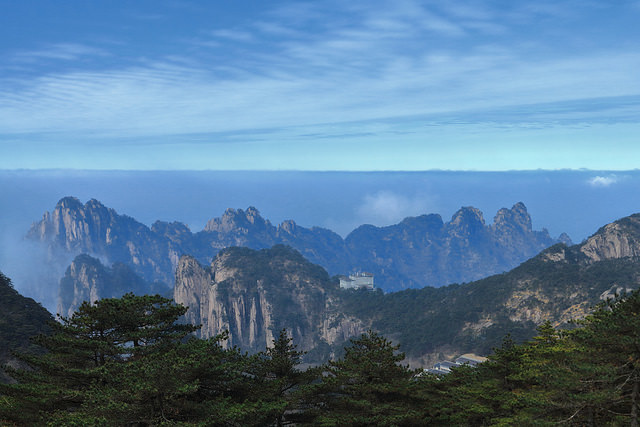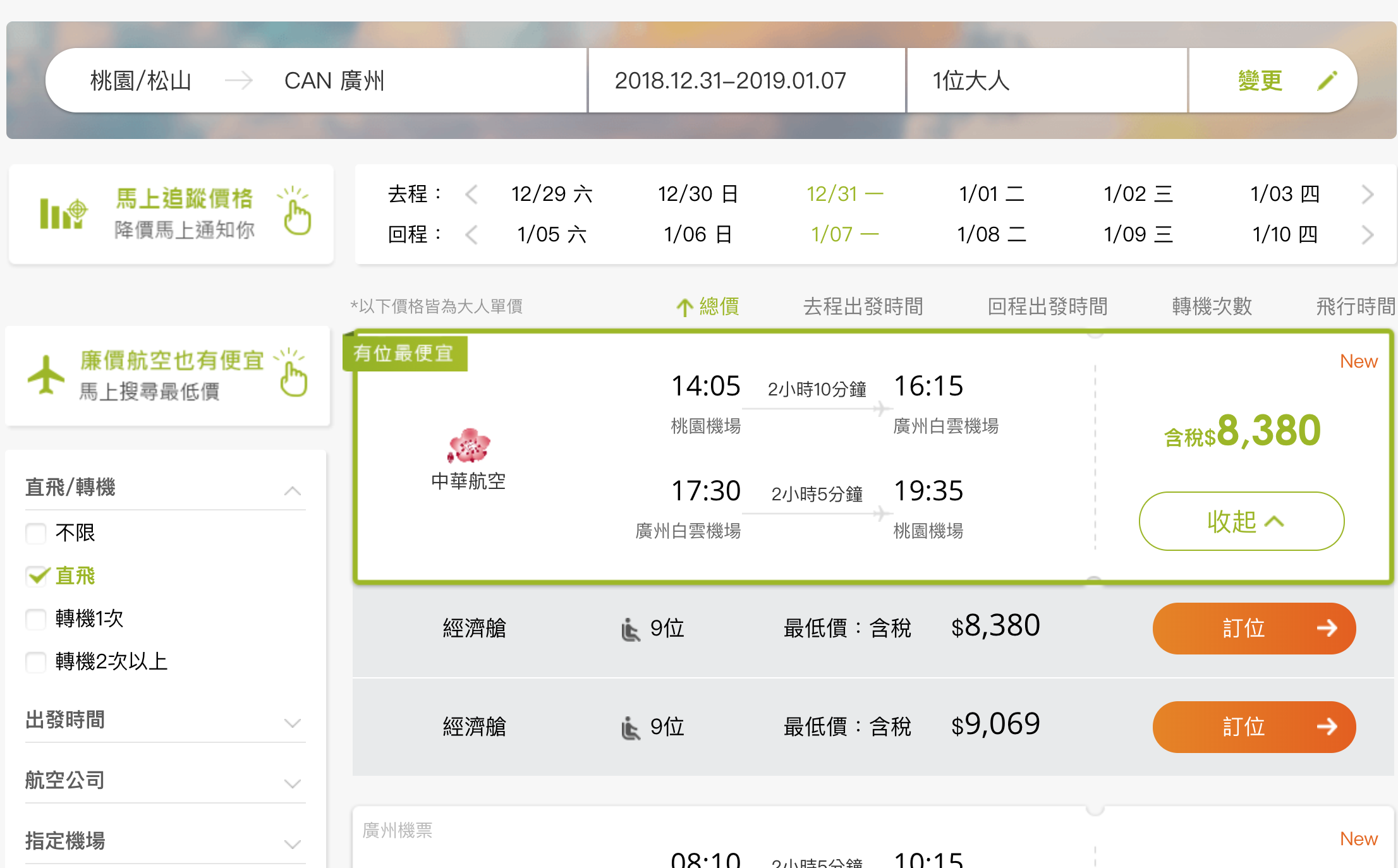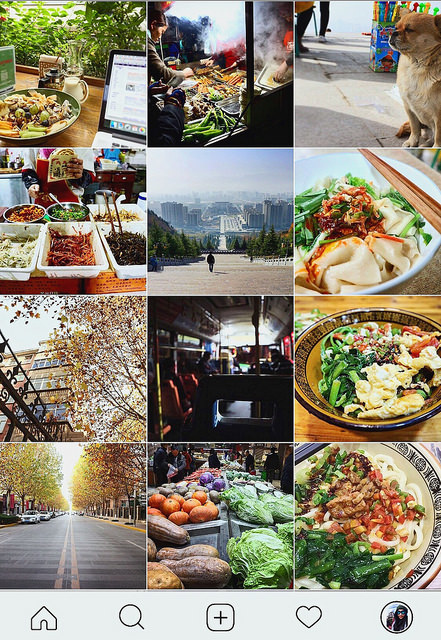This “China Travel Guide” is to tell you all the things–including accommodation, transportation, luggage, and Internet–that you will need to know before & during visiting China!
1. Flight Tickets
Prices can differ a lot depending on cities. Cities along the coast(such as Shanghai, Nanjing, etc.) might be cheaper(around USD$160~200); while the inland cities usually cost over $320.
Recalling the first time going to China, I knew nothing then. So, I booked my tickets and hotels right away on Expedia without doing any research. After gaining some experiences after visiting there several times, I realized how reckless and stupid I was. So, here I’m sharing my experiences with you:
✴︎ Price Comparison Websites:
◆ Skyscanner / Expedia
I merely use the popular site, Skyscanner, as there are people online expressing concerns about the reliability and safety of its sources. Personally, I prefer Expedia. The customer service is good, you can book directly without issue, or use the site as a simple price checker.
◆ FunTime
But recently I found a nice price checker –FunTime.
- Reliable: Price on FunTime may be cheaper than Expedia, and more reliable than Skyscanner because its source is all from certified Taiwanese company, most of which are the ones that you and I might be familiar with.
- Promotional Wall: This is one of their biggest features. In addition to the advanced search for low-cost fares, there is a “Promotional Wall” that updates the best bargain of certain airlines!
- Automatic Search for Best Bargain: There is an option for “Undecided Departure Date” –if your traveling day is flexible, and you want to find out the day with the cheapest price, this feature can show you the cheapest price within a certain period (e.g. 3 months).
✴︎ Airlines’ Official Website
When buying a ticket to China, I first use price comparison sites to find out which is the cheapest airline. And then, I’ll go to the airline’s official website (such as Air China, China Eastern, etc.) to search for the same flight.
WHY?
Because airlines will occasionally launch special discounts, the prices quoted on these. Because airlines will occasionally launch special discounts, the prices quoted on these official websites will often be cheaper than the prices advertised on price comparison sites. Although the comparison site will often have a ticket + hotel special offer, although the comparison site will often have a ticket + hotel special offer, the choice of accommodation is often limited. If the official website has a ticket discount and you can find accommodation through a site such as Booking.com, the total price will probably be no more expensive than the special deal.
✴︎ Timing
As for whether you should buy plane tickets early or wait until the last minute, as to whether you should buy plane tickets early or wait until the last minute, according to personal experience, if you see a good deal, take it. Unless your date is fairly flexible and you have time to wait. But generally speaking, the closer to the date of departure, the higher the price will be.
✴︎ Travel Agency
Of course, you could simply ask a local travel agent if they have any discounted tickets, but this is also a matter of luck.
✴︎ China’s Domestic Plane Tickets
If you want to buy flight tickets for flying within mainland China, the websites C-trip or Ali-trip are often used by locals, and the latter especially often offers heavily discounted tickets.
2. Passport & Visa
ID, ID, ID, ID, ID. This is so important that I have to repeat 5 times.
When traveling to China, most countries need to apply for a Visa. Here are the documents required to apply for a China Visa:
- Passport (at least 6 months to desired), 2″ photo(taken within 6 months), application form.
- Place: Please find the Chinese agency or travel agency that operates the affair in your country.
- You can also apply for a one-time entry permit directly at any airport in China for a- You can also apply for a one-time entry permit directly at any airport in China for three months (the above-mentioned documents are still required).
3. Accomodation

✴︎ Booking.com
Covers all prices and types of accommodation. I mostly stay in a youth hostel when visiting China. Booking.com provides plenty of choices and the prices are also usually very cheap, so it’s usually my first choice.
✴︎ Airbnb
Usually more expensive than hostels and hotels; however, since it’s mostly the locals. Usually more expensive than hostels and hotels; however, since it’s mostly the locals renting their rooms/houses, travelers have the opportunity to get in touch with different cultures. The disadvantage is that it may be necessary to adapt to the landlord’s schedule, and there are relatively more restrictions. Also, be cautious when choosing a letting and be sure to check the reviews carefully for safety concerns.
✴︎ Expedia
If you want to stay in a better-quality hotel, you can choose a flight ticket + hotel. If you want to stay in a better-quality hotel, you can choose a flight ticket + hotel package to get a cheaper price. However, you can still buy your ticket and accommodation separately, which sometimes get a cheaper price.
✴︎ Other International Booking Sites
Agoda/ Hotels.com/ Trip.com
These are other international booking sites that I use, and a better price can be found occasionally. There are just a few things to note:
- Compared to Booking.com, some websites first show the price without tax initially so it seems cheaper. But when making payment, the additional tax would be included, so remember to make sure before payment.
- Agoda will charge overseas credit card fees, although you can ask customer service for a refund, but it’s quite troublesome. Besides, the refund can only be used in the next Agoda bill, so make sure it is cost-effective.
- Hotels.com there is a “Book 10 nights, Get 1-night Free” event.
- Trip.com is the Ctrip in HK(see the “China Domestic Booking Sites” below), sometimes there could be good prices. Comparing to China’s Ctrip, HK’s advantage is that there are no restrictions on ID authentication and payment; while the disadvantage is that if you are looking for accommodation in China, there are still fewer options than China’s version.
✴︎ China Booking Sites
Such as Ctrip, Qunar.com, Yilong-wang and so on. Now I mostly use Qunar to book my room for my China travel, because:
- Plethora of Options: Much core than the International booking sites. But be noted that to choose the “Accept foreign guests” accommodations in case of being rejected.
- Price Discount: Sometimes, there will be cheaper prices than Booking.com, plus they often offer cash back, saving you some money.
However, as the sites are based in China, having a Mainland mobile phone number and a third-party payment system (WeChat payment, Alipay) may be necessary. Even if you are not able to book via these sites, they still make excellent. Even if you are not able to book via these sites, they still make excellent sources of reference for a larger number of Chinese accommodation reviews than the international booking sites.
4. Internet
Nowadays, getting online while traveling is pretty essential for most people. The methods of getting online are fairly similar for every country, and can be divided into the following three methods:
✴︎ Portable WiFi
VPN Necessary / Price: Mid-range / Unlimited data
For unlimited online data, the cost is about $6/day, but you have to download a. For unlimited online data, the cost is about $6/day, but you have to download a VPN app to get past China’s firewall. The network connection is more stable and faster.
✴︎ Internet roaming
VPN unnecessary / Price: Highest / Unlimited data
The advantage is that you are not restricted by China’s Great Firewall and the speed is. The advantage is that you are not restricted by China’s Great Firewall and the speed is generally faster; however, the price is much higher than other options.
✴︎ SIM Card
VPN unnecessary / Price: Lowest / Limited data
Priced according to the amount of data required, ranging from NT$10/GB to $16/GB.The China-Hong Kong SIM card is the most common choice, and is unrestricted by the Great Firewall, though you need to select your sellers carefully. Those who need more info can find it on forums such as backpackers.com.tw.
* If you just use Facebook, Instagram, Line, or browsing web pages, 1GB should be sufficient.
5. Useful APP & Sites

Before traveling to China, finding reliable information is the most difficult part of the preparation process.
As many Chinese use websites located only inside the Great Firewall, a lot of information is not available to foreigners. Also, most of the stores, restaurants, and hotels have no official website or e-mail, so you’ll have to crawl through the forums to get information from other netizens. However, sometimes the information online is limited, and the only way to be sure is to check in person.
It must be said, WeChat is a powerful app, combining the functions of Line, FB, Google, Uber. In addition to chatting and sharing photos, users can also follow official accounts, search for information, and payment services, call taxis, book tickets, etc. WeChat has become a major community channel for the Chinese.
Therefore, many stores, sightseeing spots, even local transportation systems have an official WeChat account, similar to a Facebook page. So, if you can’t find the information you want on the Internet, you can try searching for it on WeChat. Train and bus timetables, along with stores, tourist information will often be posted there, and you can send an inquiry message to them directly.
✴︎ Baidu Search & Map
Generally speaking, to search for reliable information regarding China, it’s necessary to use their websites.
This is especially true when researching locations in China, as Google maps often turns out errors in its information; also, street view is not available, making Baidu Maps the way to go. It has all the features of Google Maps and has several extra ones that are especially useful, such as offline maps/navigation, sortable tagging, and navigation reminders.
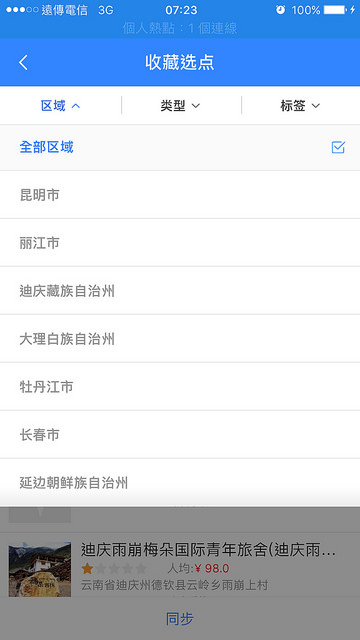
✴︎ Mafengwo, Backpackers.com.tw, C-trip & Qunar
I often use these travel websites to find tourist information. The travel notes, itineraries, questions and answers from netizens are valuable sources of information. My first choice is Mafengwo, as it has sufficient and organized information, screening functions and a better layout. It also provides a brief guide for each attraction, which is very helpful.
✴︎ Dianping、Meituan
These 2 sites/apps are mainly used by locals to search for food. There are all kinds of reviews from the netizens. Mainland friends strongly recommended that, it is hard to get a bad choice when you follow Dazhong-dian-ping. And to my experiences, that’s quite true.
Download Link:
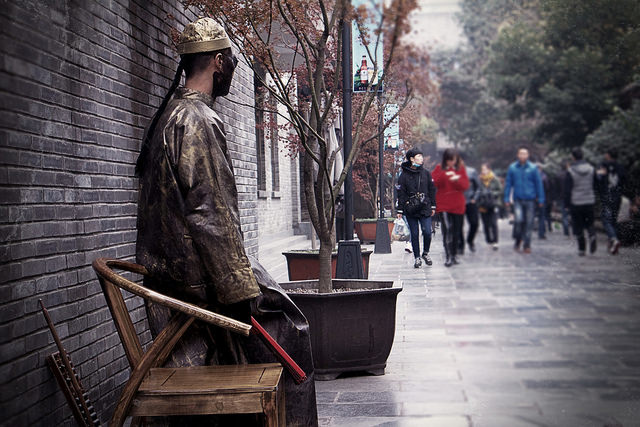
6. Package
I subscribe to the philosophy of simple but happy travel. Basically, I try to stick to three principles: light, small, and few.
✴︎ Suitcase
Forget about large suitcases! I go to China mainly to roam in the mountains and swim in the sea, so for my stuff, the lighter the better. A backpack and a carry-on are more than enough!

✴︎ Clothing
△ Underwear: Disposable underwear is both time- and labor-saving. But if you’re traveling for more than two weeks, bringing along two or three pairs of quick-drying underwear is a viable alternative option.
△ Outerwear: Taking the backpacker route, I usually bring only 2~3 sets of light, thin clothing. For winter, skip the sweater! It only makes your bags heavy and big. Try the onion-clothing method: wear layers! A vest, a T-shirt, a shirt, a down jacket, and finally a Gore-Tex, both wind and waterproof and warm. Also, wear your thickest clothes on the day of the flight, which reduces the amount of. Also, wear your thickest clothes on the day of the flight, which reduces the amount of baggage.
If you’re traveling to the western or northern regions of China, scarves, hats, gloves, and masks are a must, as the temperatures there can get punishingly cold!
△ Shoes: Just keep two things in mind when choosing your shoes: comfort and durability. Then the rest will depend on your itinerary: if you’re planning on hiking in severe temperature or weather, for example, non-slip, waterproof boots are ideal.
✴︎ Personal Item
As I often stay in hostels rather than hotels, you have to prepare many itineraries by yourself.
- Towels – Hostels do not provide this. Even if in some hotels, I would rather use my towel, reducing hygiene concerns. It is recommended to bring a smaller one instead of a big one.
- Slippers – Although most hostels will offer, I still prefer using my own. Bring a cheap and light one.
- Personal Toiletries– Toothbrush, body wash, and skincare products, etc. Keeping to the principle of the lighter the better, make full use of any trial kits and gifts you get from various accommodations. If you’re taking fluids in your carry on, they should be less than 100mL and should be packed into a sealed bag, with the total volume not exceeding 1L.

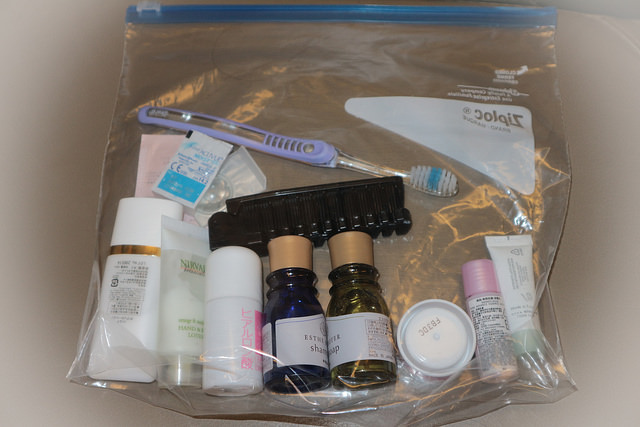

- Tissue– This is a MUST! If you don’t bring tissues, you’re in for a headache: many restaurants and toilets in mainland China do not provide any tissues and toilet paper, so bringing a pack or two of your own isn’t overdoing it.
- Hand sanitizer: A super useful and helpful thing during the whole trip– before eating, after going to the toilet– sanitize yourself at any time!
- Portable powerbank – You cannot put this in your check-in luggage. Instructions and manufacturer’s label on the powerbank are required, and each powerbank must be below 20,000 mAh.
The regulations to powerbank differs from each airport,
as well as the carry-ons. Some are particularly strict, scrutinizing everything in bags; while some just give a general check.
✴︎ Wallet & Small Pack
I usually carry 2 small bags with me when traveling: one is the wallet to put frequently-used credit cards, IDs, and a small amount of money; the other one is for passport, and other IDs that are less in use. This way, I can reduce spread the risk of losing them, and also save the need to take out large amounts of cash and important IDs whenever making a payment.

7. Notes & Tips

✴︎ Charge Sockets
Sockets in China are generally 220V.
However, many chargers for mobile phones, digital cameras, laptops and other electronics. However, many chargers for mobile phones, digital cameras, laptops and other electronic products support 110~240V conversion, so check the instructions on your charger beforehand. China sockets are mostly three plus two, five-hole sockets.
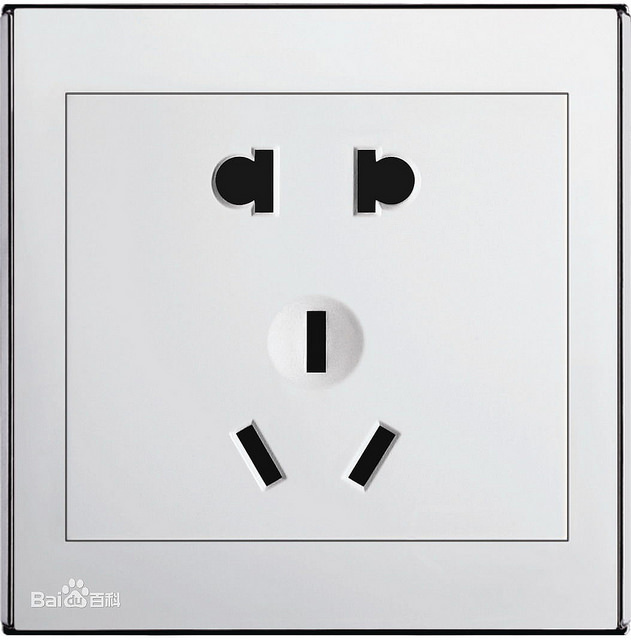
✴︎ Always Carry Change with You
As electronic payment systems have become the mainstream in China, most locals don’t bring a wallet when they go out, and some stores don’t even keep much cash on hand. However, Taiwanese people are in the habit of traveling with cash, so be sure to keep some cash and change on you to buy subway tickets and take public buses.
✴︎ Under the Shoes
Some people have heard that the Chinese have the habit of spitting on floors. Well, it’s true that it still occurs sometimes, depending on the city’s development, tourism, and the degree of internationalization. Also, and air quality seems to have an impact on it as well(?). Like the coastal cities I’ve been to, such as Guangzhou, the spitting things merely happen; or like the cities with many tourists visiting, such as Lijiang and Dali, are rare to be seen as well. But like Baoji–a city in Shaanxi–,you have to mind the floor all the time, otherwise, you might step on the “target” every 2 steps. Ah, but maybe you are going to be numb after some while, as the locals do.
✴︎ Postcards
(2018. 04) The postage for postcards sent from China to Taiwan is RMB¥1, and for(2018. 04) The postage for postcards sent from China to Taiwan is RMB¥1, and for other countries, it is RMB¥4.5. The latest information can be found on the official website of the China Post. It takes about 1~2 weeks t to arrive in big cities, depending on the region. To my experience, except the one I sent from Tibet has probably sunk into the sea, all the others had been received successfully so far.
8. Budget
Personally, I save as much as I can. Before going to China for the first time, I honestly had no idea about the prices there, neither did I have an idea about how to set the budget. But usually, I don’t shop in China, I visit tourist sites more often instead. so, it is not that difficult to control and plan my budget. I divide this part into 2 parts, before and after the trip (the price below is only for reference):
✴︎ Before the Trip
- Airfare -Generally speaking, flight tickets to fly from Taiwan to the cities on the south coast in China cost around NT$5~8,000, and to the inland or northern cities cost about NT$9~13,000. For regions like Xinjiang and Tibet where there is no direct flight, tickets will be considerably more expensive.
- Accommodation: Whether you have booked in advance or not, you can still check the room rate first. Beds in youth hostels cost about RMB¥30~50; Airbnb cost about RMB¥80~100 (for the cheaper rooms); chain hotels cost about RMB¥110~; luxury hotels about RMB¥500~ (prices above imply per person per night)
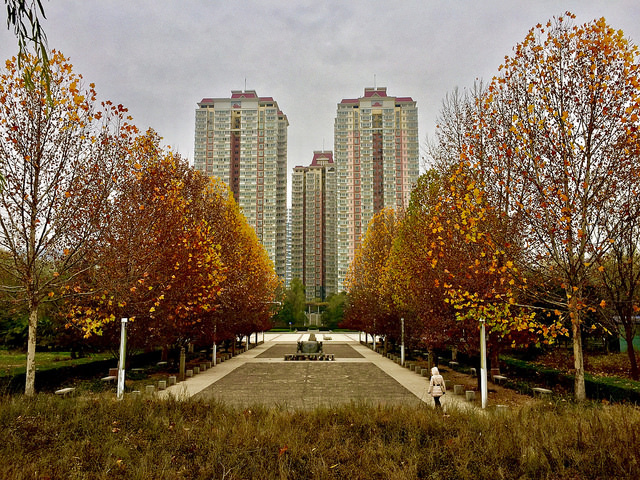
✴︎ During the Trip
The highest spending in this part is usually tickets for attractions. The tickets are much much higher than other spending.
- Transportation (trains, buses): Transportation between provinces and cities is mainly based on railways and long-distance buses. You can check prices on 12306/ Ctrip.com. On average one journey is about RMB¥100. A ticket for a city bus is around RMB¥2, paying onboard at the front door and getting off at the back door.
- Attractions: Info of tourist attractions are almost all available online. Prices for tickets range from RMB¥50 to ¥200 and above. Also, many scenic spots require tourist bus or cable car rides, which is an extra cost, so flexibility for budget is required. However, some museums offer free tickets.
- Dining: The least spending item of all, especially for individual travelers. Besides the first- and second-tier cities in China, a bowl of noodles is only about RMB¥7 and the serving is HUGE; while in a big city, the price doubles. If a group of people share the bill at a restaurant, it usually costs RMB¥35 per person. My budget for dining is about RMB¥100/day.
Please feel free to leave a message below or contact me if you have any questions!
📌 Coupon for Travels!
🏠Accommodation
Agoda(Sale Now!)
Trip.com
Booking.com
Hotels.com(Limit Sale,Save up to 75%!Book 10 nights and get 1 night for FREE!)
✈️Flight


